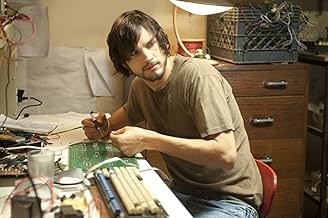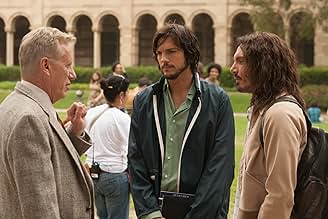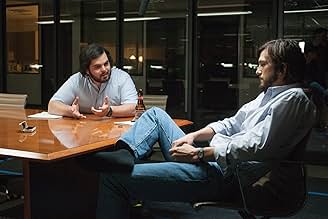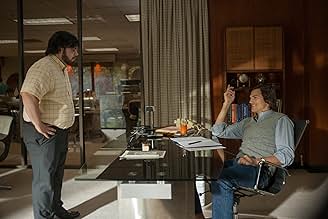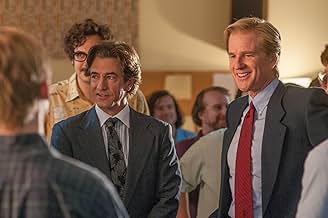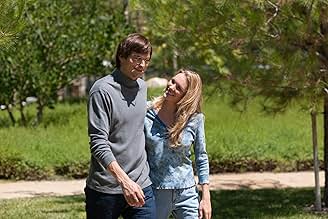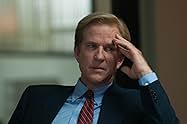L'histoire de l'ascension de Steve Jobs du décrochage universitaire à l'un des entrepreneurs créatifs les plus vénérés du 20e siècle.L'histoire de l'ascension de Steve Jobs du décrochage universitaire à l'un des entrepreneurs créatifs les plus vénérés du 20e siècle.L'histoire de l'ascension de Steve Jobs du décrochage universitaire à l'un des entrepreneurs créatifs les plus vénérés du 20e siècle.
- Réalisation
- Scénario
- Casting principal
- Récompenses
- 2 nominations au total
Avis à la une
They glossed over years -- Heck decades at points, concentrating on Apple more than Steve Jobs in my opinion... maybe a better name would have been "Apple & jobs - Some of the Years"!
Wait for the movie to hit your TV and know you will still be missing more than half the story!
Unfortunately, the script isn't strong enough to give us the whole picture of Steve Jobs' remarkable life. As the film traces the rise, the fall, and then the beginning of the resurrection of Apple the computer brand, the focus is divided too much between the company and the man. If you know more about the life of Steve Jobs, you'll be disappointed when you realize you're not getting to see the full arc of his life. The film would have been better off calling itself "Apple", but even then, I would have found it lacking.
This film reminded me of "The Social Network", but without the same level of entertainment in its storytelling. The supporting actors, including Josh Gad as Apple's other founder, Steve Wozniak, Dermot Mulroney, as initial Apple financier and eventual CEO Mike Markkula, and Matthew Modine as John Scully, Markkula's successor as CEO, show the passion that those closest to the company have for Apple, but the film is supposedly about Steve Jobs. While the script does touch on some of Jobs' personal life, it seems much more concerned with the company that he helped start. "Jobs" may give us a measure of the man, but doesn't do the best job at telling his STORY. Doing the best job I can as a reviewer (while still doing my other jobs), I give this one a "B".
jOBS is not a biography movie like Citizen Kane, Gandhi, The Last Emperor, The Last King of Scotland, Malcolm X, and Gladiator. But it takes all the genre clichés from these movies, while following the same story structure of Social Network.
Since I mentioned David Fincher's movie Social Network, I will start my review with the major problem in jOBS: Considering Social Network was an aptly marketed everyone's hero style of an average business-drama movie, in order to market a Steve Jobs life story appropriately, this wasn't the right choice. The cause of this marketing errors are the trailer, the poster with Ashton Kutcher on it, and the movie itself with Ashton Kutcher starring in it.
Then what is jOBS about? jOBS is just a simple telling of a person's epoch-making achievement like Schindler's List, Spartacus, Raging Bull, Braveheart, Papillon, The Pianist, and even David Lnych's The Straight Story. jOBS has more than a few things in common with those movies including the pain of sacrificing your beloved ones in order to succeed in your career, including similar character traits, similar ethical beliefs, similar moral decisions. jOBS is only a brief telling of what Steve Jobs gave to the Macintosh computers, just like what Oscar Schindler gave to Jews, and what Braveheart gave to Scotland. You can't expect to see the birth and death of Steve Jobs in this movie. This is not a biopic, instead it's a drama, poorly marketed good business-drama.
There are both strong and weak points in the technical side of jOBS. As a start, having no narration is a strong point, yet having not explained why Steve Jobs dropped out from college is crucially a weak point. Ashton Kutcher takes his girlfriend and goes behind bushes in the country and smokes weed. Then we get to figure it out that Steve Jobs has dropped out from college because he smoked weed and got his girlfriend pregnant. Refusing the birth of his first child due to his busy work schedules, Steve Jobs character has been made more weaker and weaker minute after minute. There is certainly a rule of character growth followed in this film, but none of this film's audiences have really bought that character growing incidents.
This is an average business-drama movie, set in the world of entrepreneurial minds. You're lonely, you always keep a positive mind but always looking for a person to trust, you are goal-oriented, you take maximum risks for every little achievements in your life, you are a reliable friend to your colleagues but they are always afraid of you, and you see every step in your life as a competition with someone else's steps in their lives...
This is a strong premise that killed the sense of making a Steve Jobs movie to honor his memory. This movie should have been made in 1997, when Steve Jobs have become the de facto chief CEO of Macintosh. And this movie could have been titled "Think Differently" as this is what it is only about. If this has been a movie called "Think Differently" made in 1997, then it could earn some recognition. Now people would come to you and ask "What did Steve Jobs do for the last 14 years of his life as a CEO in Apple?"
Developing his imagination for computer programming at Atari, Steve Jobs (Ashton Kutcher) brings in his friend Steve Wozniak (Josh Gad) to help with the hardware aspect, forming a partnership that would soon lead to the founding and development of Apple Computers, a force within the industry throughout the 1980s. Steve is not prepared for the financial demands and the ruthless business mentality, and is eventually forced out of the company he began, only to return in the 1990s with a fresh game plan on how to bring Apple back into the public consciousness, and to dominate the industry once again.
"Jobs" is a biopic with a very narrow focus, and without any sense of risk or adventure. It is so intent on covering Jobs' entire corporate career, that it simply reduces his personal life to a footnote. Stern completely glosses over Jobs' personal life, which is essential to any self-respecting biopic. The entire production feels rushed and slapped together simply to benefit from being the first one out of the gate.
To his credit, Kutcher puts forth a good effort, and he undeniably looks the part of Steve Jobs. Unfortunately, Ashton always looks like he is trying too hard to play the part, and never fully becomes the character he's portraying. His limitations on the big screen prove to be a major liability. He has developed a screen persona as likable character, which has served him well with numerous TV sitcoms. Not so much with movies.
What emerges is a movie that has "a made for TV" feel, which depicts a self-absorbed creep who stabs everyone in the back to simply to get his way that goes on for two plus hours. A thoroughly unsatisfying tribute, and we are still left none the wiser as to what made "The Father of the Digital Revolution" beyond what we already know.
Le saviez-vous
- AnecdotesAlmost all of the scenes involving Jobs' parents' house and garage were filmed in the actual Los Altos, California house and garage where Steve Jobs grew up in the 1970s.
- GaffesWhen Jobs introduces Apple's new music player he calls it "the iPod". Jobs avoided preceding Apple devices with "the", rationalizing that doing so positioned a product as a representation of a user rather than as an inanimate object. In video of the event Jobs refers to the device as simply "iPod" without any definite or indefinite articles.
- Citations
[last lines]
Steve Jobs: [narrating] Here's to the crazy ones. The misfits, the rebels, the troublemakers, the round pegs in the square holes, the ones who see things differently. They're not fond of rules, and they have no respect for the status quo. You can quote them, disagree with them, glorify or vilify them. About the only thing you can't do is ignore them. Because they change things - they push the human race forward. And while some may see them as the crazy ones, we see genius. Because the people who are crazy enough to think they can change the world, are the ones who do.
[speaking directly]
Steve Jobs: How was that?
- Crédits fousThe television advertisement in the film is named: "Iron Eyes Cody: People Start Pollution, People Can Stop It". It's credited as: "Iron Eyes Cody: People Start Pollution, People Can't Stop It".
- ConnexionsFeatured in The Tonight Show with Jay Leno: Épisode #21.187 (2013)
- Bandes originalesPeace Train
Performed by Cat Stevens (as Yusuf / Cat Stevens)
Written by Cat Stevens
Courtesy of Island Records Ltd.
Under license from Universal Music Enterprises
Meilleurs choix
Détails
- Date de sortie
- Pays d’origine
- Sites officiels
- Langue
- Aussi connu sous le nom de
- Jobs: El hombre que revolucionó al mundo
- Lieux de tournage
- Sociétés de production
- Voir plus de crédits d'entreprise sur IMDbPro
Box-office
- Budget
- 12 000 000 $US (estimé)
- Montant brut aux États-Unis et au Canada
- 16 131 410 $US
- Week-end de sortie aux États-Unis et au Canada
- 6 713 900 $US
- 18 août 2013
- Montant brut mondial
- 42 128 352 $US
- Durée2 heures 8 minutes
- Couleur
- Mixage
- Rapport de forme
- 2.35 : 1
Contribuer à cette page








